Discover practical strategies to protect your washing machine from freezing temperatures when stationed in the garage.
If you’re worried about your washing machine freezing in the garage during the colder months, you’ve come to the right place.
This article provides a comprehensive solution to prevent your appliance from freezing, ensuring its longevity and optimal performance.
From insulating your garage and the machine’s pipes to using special antifreeze products, you’ll find all the necessary steps and expert tips here.
Read on to protect your washing machine from freezing temperatures and ensure smooth laundry operations, even in the chilliest weather.
Key takeaways:
- Insulate garage, use heat tape on inlet pipes, and antifreeze.
- Wrap water supply hoses and machine with tubular foam insulation.
- Use garage heater, appliance light bulbs, and insulation for extra protection.
- Drain water and use air compressor to prevent freezing.
- Shut off water supply, use bucket to catch water, and detach hoses in winter.
Understanding the Issues of Water Expansion in Washing Machines
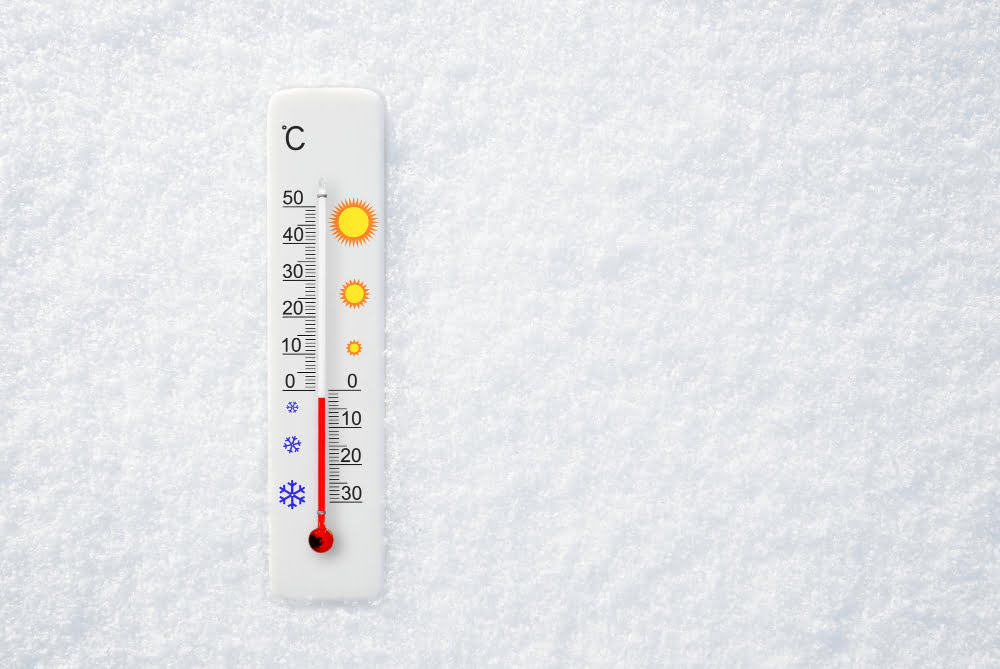
As temperatures drop, the liquid within your washing machine tends to freeze. It’s important to note that water molecules, when converted to a solid state, expand nearly 9% in volume. When confined within your washing machine’s pipes and hoses, this enlargement generates tremendous pressure which then leads to structural damage – cracks or bursts in the piping system.
Given their design and function, specific parts of a washing machine are exceedingly susceptible to the negative implications of water expansion. Elements like the water pump, water inlet valve, and internal tub can easily be damaged if water inside them freezes. Awareness about these issues is the first step to implement appropriate preventive measures.
Preventing Washing Machine Freeze in Garage
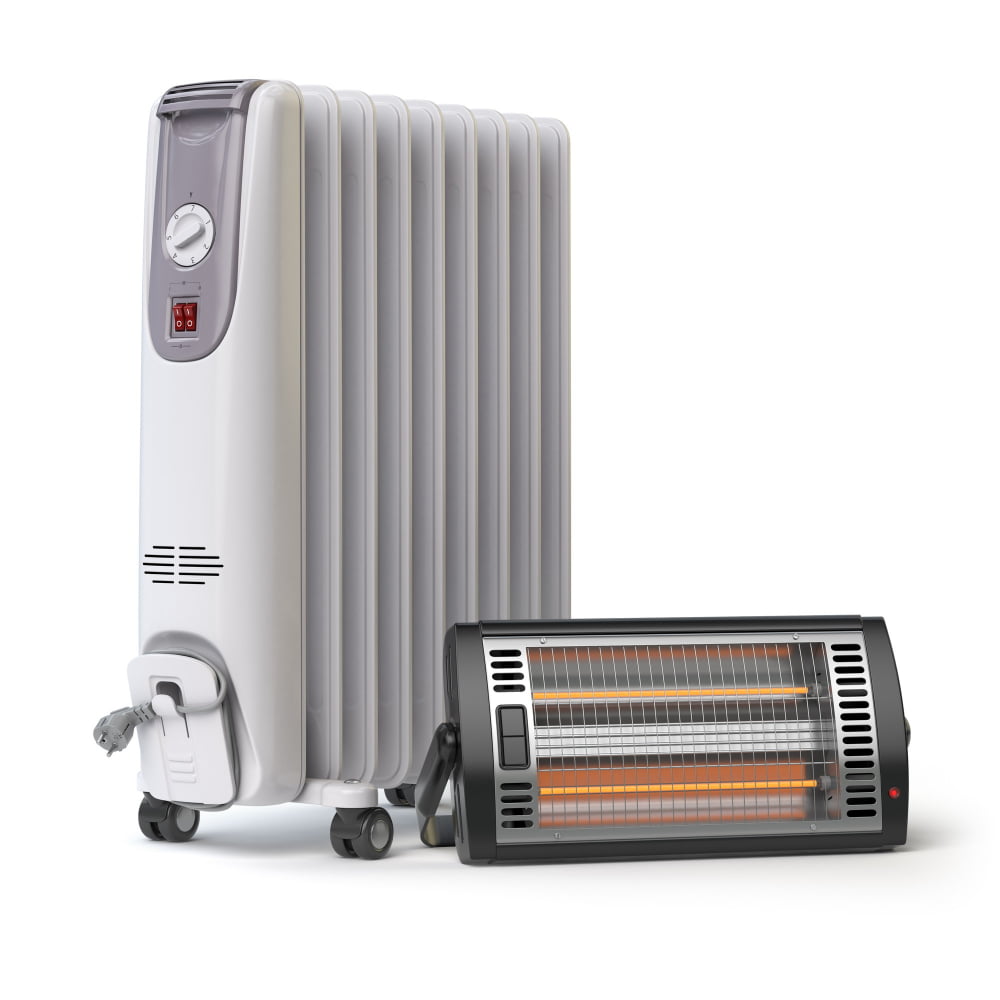
To stave off freezing, your garage must maintain a minimum temperature of 32 degrees Fahrenheit. Insulating your garage can play a crucial role here. The use of a portable heater is a commendable option, but be cautious, as it should be far from flammable items.
You can also make use of a “heat tape,” or pipe heating cable, that sticks to your washing machine’s inlet pipes. It then imparts heat to the pipes, keeping them above the freezing point.
Another smart tactic is to incorporate an antifreeze agent into the washer’s drum, similar to that used in recreational vehicles (RVs). This helps prevent any residual water in the pump and drainage from freezing. Also, consider placing a thick blanket over the machine, especially during particularly biting winters.
Remember, it’s about keeping your machine ‘warm’, not ‘hot’. Overheating can lead to other troubles, like system breakdowns.
Use of Heat or Insulation for Freeze Prevention
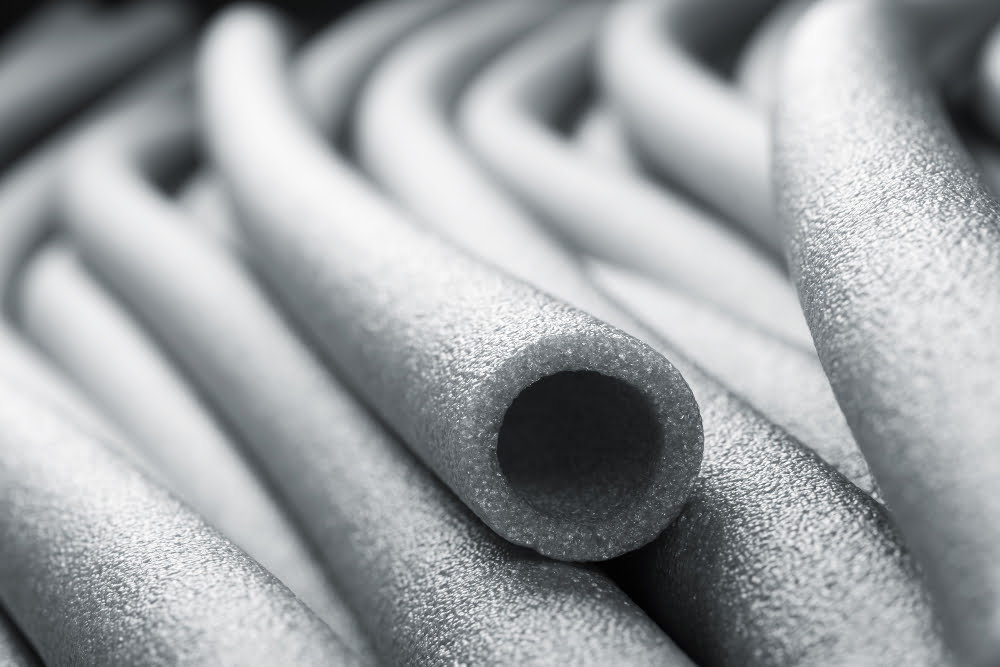
Insulating your washing machine can effectively prevent freezing. Be sure to wrap both the water supply hoses and the machine itself with tubular foam insulation. This will create a barrier against the cold and help maintain the machine’s operating temperature.
For an extra layer of protection, consider installing a garage heater to elevate the overall temperature in the space. The heater need not run continuously; using it only when temperatures drop significantly can still be beneficial. However, if the garage is less insulated or if colder climates persist, regular use of the heater may be optimal.
Remember, a garage with sufficient heat helps not only your washing machine but other appliances and vehicles. It’s a worthwhile investment for overall garage functionality and efficiency. Investing in an energy-efficient heater can also save costs in the long run.
Lastly, consider using appliance light bulbs within the washing machine. These types of bulbs produce heat that can help stave off freezing temperatures, especially when paired with high-quality insulation. However, ensure the bulb is approved for appliance use to avoid any potential damage or fire hazard.
By combining insulation methods with heat sources, freezing temperatures can be kept at bay, ensuring your washing machine remains functional throughout the colder seasons.
Ways to Ensure Water Draining to Prevent Freezing
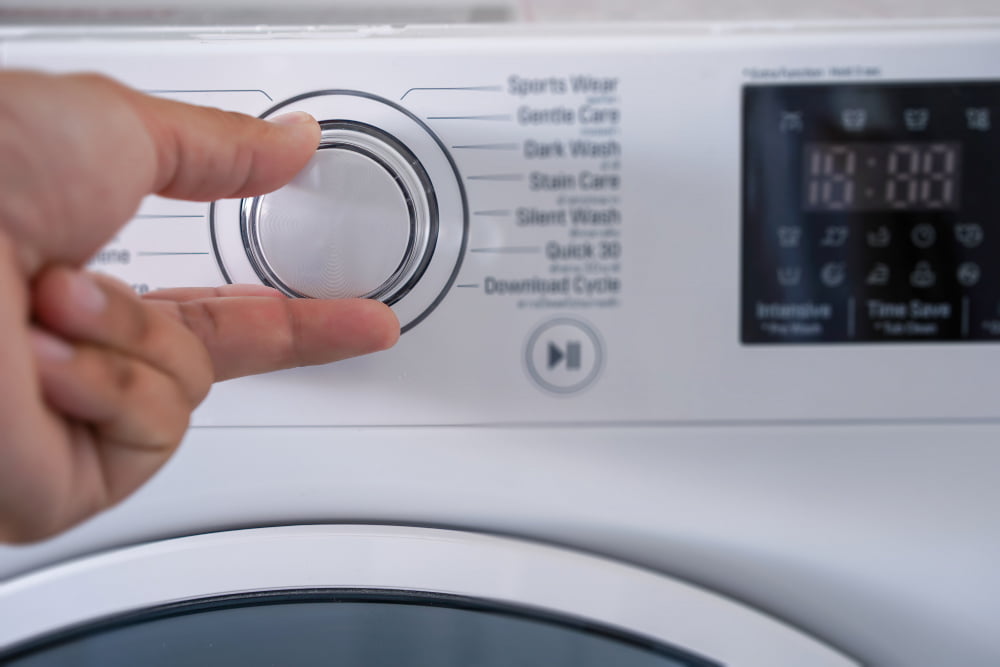
To prevent potential freezing, it’s essential to eliminate residual water left in your washing machine’s hoses and interior parts after every laundry cycle. This can be done using a few simple techniques.
1. Run an additional rinse cycle: Use the settings on your washing machine to do a final rinse cycle after your last load, with no clothes in the machine. This will push out any remaining water in the appliance.
2. Thoroughly drain the hoses: Detaching and tipping the hoses downward will allow any trapped water to escape. Ensure you have a bucket handy to capture any runoff.
3. Use an air compressor: For a more comprehensive job, consider forcing out any lingering moisture with an air compressor. Remember to adjust your air compressor to a low PSI to prevent any damage to the hoses.
These steps, when performed consistently, especially before long periods of non-use, can prevent water from freezing within your washing machine when kept in the garage during the cold months.
The Process of Shutting Off Water Supply to Washing Machine
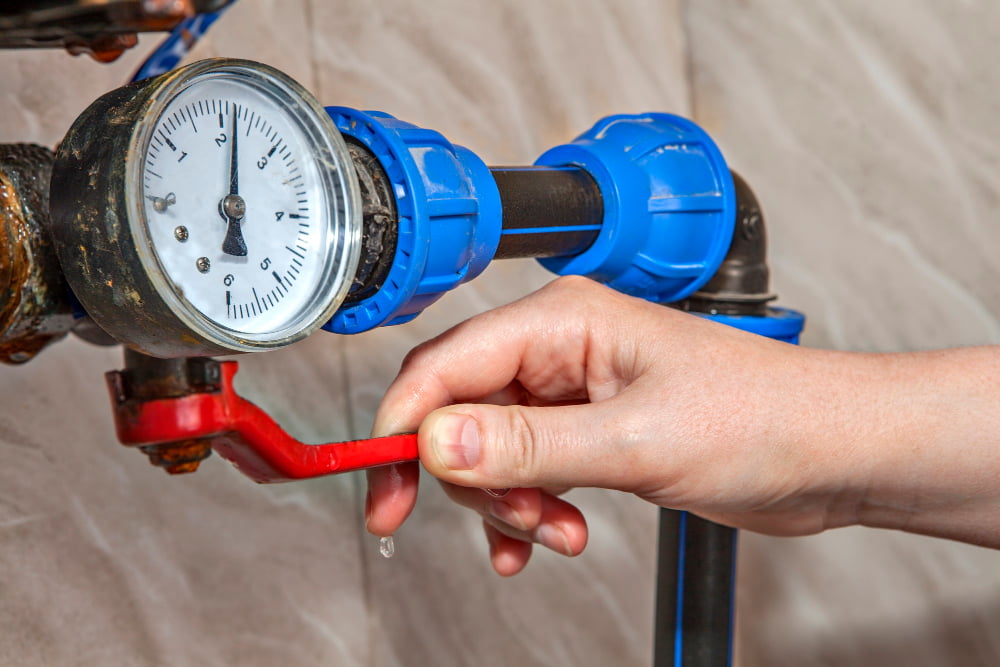
Initiating this process begins with locating the two water-supply valves — normally positioned behind the appliance. Once identified, rotate both valves clockwise to the point of resistance. This action effectively inhibits water flow to the machine.
Additionally, it’s crucial to relieve the pressure in the washing machine hoses. This is done by setting the washer to run a brief cycle without any laundry. Going through this process not only ensures no water remains in the hoses but also verifies the cessation of water flow.
To guarantee no leakage, it’s recommended to use a bucket or similar container to hold up the ends of the hoses.
Lastly, it’s prudent to detach the lines from the valves during winter periods when the machine is not in use. This eliminates the likelihood of water trapped in valves freezing and causing rupture, thereby preventing any unnecessary damage. Remember to place the ends of the hoses in a basin to catch any draining residual water.
Taking these appropriate steps in shutting off the water supply to the washing machine can stave off potential freeze-related malfunction or damage during colder seasons.
Regular Maintenance to Avoid Washing Machine Freeze
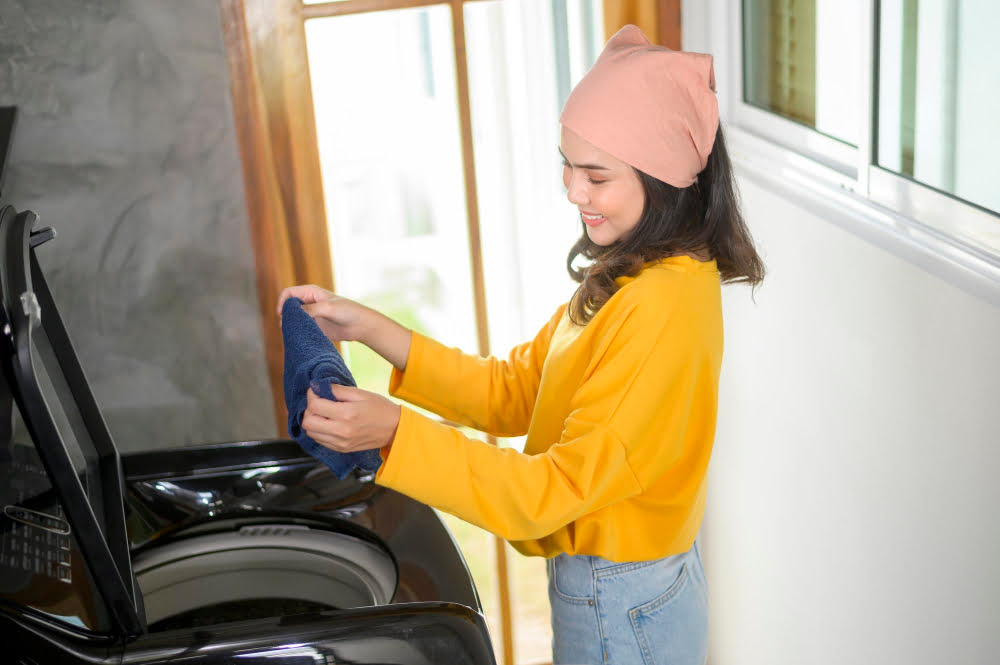
Regular maintenance falls as a crucial factor in preventing your machine from temperature damage. It’s a holistic approach that takes multiple steps into account.
1. Draining excess water: After completing each load, ensure water is adequately drained from both the machine and pipes. Lagging water is prone to freezing; punctual and thorough draining can eliminate this hazard.
2. Inspecting pipes and hoses: Regularly check your appliance’s pipes and hoses for any signs of freezing or damage. Early detection can save you from extensive repairs or possible replacement.
3. Evaluating the area around the washing machine: Ideally, it should be free of dust and debris which could exacerbate the freezing conditions. Cleanliness can aid in maintaining a proper temperature.
4. Frost stats: Devices like frost stats can monitor and manage the temperature around the machine. These ensure your machine is running optimally, even under adverse conditions.
5. Lubricating mechanical parts: Ensuring all mechanical components are lubricated will protect them from freezing and wearing out in cold temperatures.
Remember, a well-maintained washing machine is not only less likely to freeze but also more efficient and longer-lasting.
The Importance of Suitable Washing Machine Cover for Cold Weather Protection
A washing machine cover, specially designed for cold weather, can provide an added layer of protection against freezing temperatures. These covers, often weather-resistant and insulated, can significantly minimize the machine’s exposure to frigid atmospheres. Not all covers, despite their size or aesthetic appeal, can deliver this much-needed shielding, so it’s crucial to select the right one.
Here are some key considerations when choosing a suitable washing machine cover for cold weather:
- 1. Material: Opt for a cover featuring strong, durable material with built-in insulation to trap heat and ward off cold.
- 2. Size and fit: The cover should snugly fit your washing machine. An incorrect fit might leave areas exposed to cold air.
- 3. Functionality: Ensure the cover allows easy access to the control panel and doesn’t obstruct the air vents.
- 4. Weatherproof: A good cover guards against more than just freezing temperatures. It needs to resist potential garage condensation, rain, or snow that may sneak in.
By following these guidelines, you can increase the safety and efficiency of your washing machine, keeping the cold at bay in the toughest of winters.
FAQ
Can you put a washing machine in an unheated garage?
Yes, you can place a washing machine in an unheated garage, but ensure good ventilation to prevent condensation that can ultimately lead to motor damage or mould and rust issues.
Is it safe to put a washing machine in the garage during winter?
While it’s possible to put a washing machine in the garage, it’s imperative to consider the potential risk for damage from water freezing if the temperatures in the garage drop below freezing during winter.
Is it OK to run washing machine in freezing weather?
Running a washing machine in freezing weather is not advisable due to the risk of residual water in the pump and hoses freezing, expanding, and potentially damaging the pipes.
What precautions should be taken to protect a washing machine from freezing in the garage?
To protect a washing machine from freezing in the garage, ensure it’s properly insulated, keep the garage heating on, and disconnect the machine during particularly cold periods.
How do space heaters and insulation methods contribute in preventing a washing machine from freezing in the garage?
Space heaters and insulation methods prevent a washing machine in the garage from freezing by maintaining a warm environment and reducing heat loss, respectively.
Can a heat lamp prevent a washing machine from freezing when stored in an unheated garage during extreme winter conditions?
Yes, a heat lamp can help prevent a washing machine from freezing when stored in an unheated garage during extreme winter conditions.